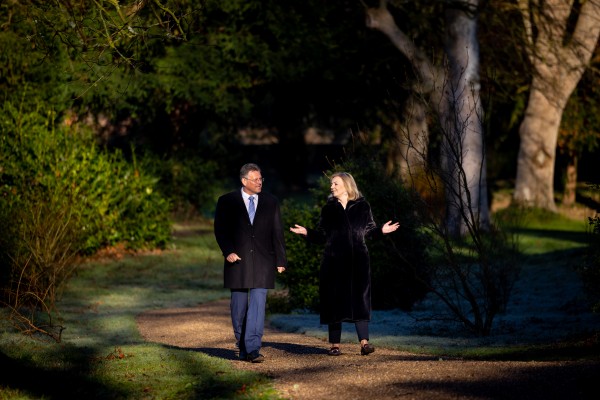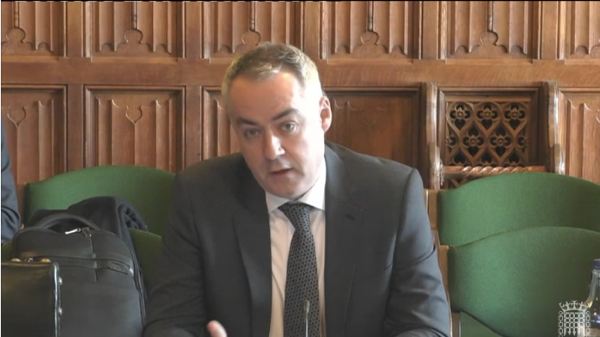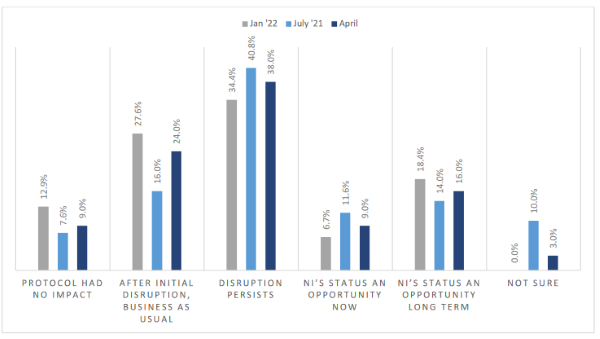Brexit & Beyond Newsletter
17 January 2022
 Welcome to the 17 January 2022 Brexit & Beyond newsletter
Welcome to the 17 January 2022 Brexit & Beyond newsletter
Last week, Liz Truss and Maroš Šefčovič held their first face-to-face talks. This week, intensified talks will take place on the Protocol on Ireland/Northern Ireland between EU and UK officials. The Committee for the Executive Office heard evidence from junior Ministers on Brexit matters, while the impact of the loss of EU funding on NI’s budget was discussed at the Committee for the Economy. Manufacturing NI has published the findings of its recent survey on the Protocol. The UK Government has published the conclusions of its review of Intergovernmental Relations.
Truss and Šefčovič meet at Chevening
UK Foreign Secretary Liz Truss and European Commission Vice-President Maroš Šefčovič held a two-day meeting at Chevening House last week. This was the first time the pair had met since Truss took over the Brexit portfolio following Lord Frost’s resignation in December. Truss and Šefčovič released a short joint statement, saying there was a “cordial atmosphere”. UK and EU officials will meet this week for intensified talks and the chief negotiators will meet again on 24 January. The statement concluded, “We share a desire for a positive relationship between the EU and the UK underpinned by our shared belief in freedom and democracy.” Šefčovič tweeted after the meeting that “it's time to start taking issues off the table.” At the start of the talks, Truss tweeted that her priority is “defending the Union and protecting the peace.”

UK Foreign Secretary Liz Truss and European Commission Vice-President Maroš Šefčovič in the grounds of Chevening | Source: European Union, 2022. More pictures from the meeting can be viewed here
The BBC notes that the last time there was a joint statement from the chief negotiators was February 2021, when Michael Gove was the UK’s representative. RTÉ reports on the meeting with some comments from an EU diplomat: “Liz Truss [was] emphasising publicly and privately that the UK would like to do a deal sooner or later. But when it came down to the specifics the UK side quickly retreated back to fairly traditional positions, more or less based on the demands of the Command Paper.” The Institute for Government has a useful overview from October 2021 on the areas of disagreement between the UK and EU, including on customs, SPS rules and governance arrangements.
Junior Ministers give evidence on Brexit
The Committee for the Executive Office heard evidence and received a written briefing from junior Ministers in the Executive Office on EU Exit matters. Junior Minister Declan Kearney (Sinn Féin) highlighted the Nationality and Borders Bill currently going through the UK Parliament under which non-Irish EU nationals will require an Electronic Travel Authorization (ETA) to travel to Northern Ireland. They have received clarification from the Home Office that there will not be routine controls conducted in the Common Travel Area and there will be no immigration controls on the land border. The Lords Sub-Committee on the Protocol has also written to the Government about the Bill and its implications for the movement of people across the land border into Northern Ireland.
Regarding supply of medicines to Northern Ireland under the Protocol, junior Minister Gary Middleton (DUP) said, “given the complexity of the issues involved, detailed analysis will be required to ascertain if the [EU’s] proposals will ensure that it's a long-term, stable solution for our medicines supply.” He raised concerns about labelling requirements. Kearney said he thinks they can be “reassured that there is an absolute commitment” on the side of the European Commission regarding access to medicines. He said that the Commission’s action to resolve the complex matter “indicates that there is nothing within this impasse which is beyond resolution”.
Middleton said the First Minister and deputy First Minister haven’t yet met together with Liz Truss (although the DUP and Sinn Féin party leaders have met with her). Kearney said he thinks that if Truss is prepared to “bring a new attitude”, they can “find the landing zones”. In relation to contingency planning, Kearney said there is a level of uncertainty regarding Article 16, and that on an ongoing basis, interdepartmental working groups are engaging with relevant personnel and anticipating situations. Middleton said the ongoing negotiations need to come to a timely conclusion. He said Article 16 would in itself be time-bound and “the time that is there needs to be used wisely, the Government must legislate for unfettered access on an East-West, West-East basis”. However, he added, “all of us are hopeful and we want to see a resolution”.
The Committee also received information from the Executive Office on areas of agreement between the European Commission and UK Government, replacement EU funding, and the Office for the Internal Market.
Post-Brexit funding
On 12 January, the Committee for the Economy took evidence from Department officials on the 2022-2025 Budget. The Committee heard from officials that the lack of EU replacement funding and continued under-investment in skills “will hamper [the Department’s] ability to drive forward the economy, and address the impact of the pandemic, and the poor starting position of the skills base.” The Department for the Economy received on average around £65 million each year in EU funding before Brexit.
Officials said that the proposed budget outcome in real terms is a cut of 8% in year one, 11% in year two, and 13% in year three. They said that by year three, the lack of replacement EU funding creates a £47 million gap in the budget and highlighted, “by not addressing the loss of structural funding, the proposed budget is really disinvesting in those skills and innovation areas and this will impact our young people and widen the skills gap, and detrimentally affect employment levels.”
Some further detail on replacement EU funding can be found in recent correspondence to the Committee for the Executive Office.
Investment in Northern Ireland
The Commons Northern Ireland Affairs Committee is conducting an inquiry on investment in Northern Ireland. In relation to Brexit and the Protocol, Gareth Hagan of OCO Global told the Committee that he sees the Protocol as an advantage: “The fundamentals are the dual market access that we have and the proximity to a very significant market for Northern Ireland and the UK, which is basically on our doorstep. In any context, those would be looked at as a very significant competitive advantage that one would seek to leverage,” he said.
 Gareth Hagan, Deputy CEO of OCO Global | Source: UK Parliament
Gareth Hagan, Deputy CEO of OCO Global | Source: UK Parliament
Pivotal Public Policy Forum Director Ann Watt emphasised that investors look for stability in government, and a clear economic and investment plan. Hagan agreed that uncertainty is unhelpful, however, he added that “the investment pipeline in terms of investors with an interest in Northern Ireland is stronger than it has ever been”. Hagan noted that NI’s position is also attractive to UK companies and it shouldn’t be looked at purely through international investment. He said the downside of NI’s unique position is “the uncertainty and the complexity, and, secondly, the political noise that sits around it.”
Watt had a “word of warning” about the bypassing of the NI Executive in in delivering the Shared Prosperity Fund(SPF) and Levelling Up Funds. She said, “there is a risk of funding coming directly from the UK Government and perhaps not being best used strategically to connect with the overall economic development plan in Northern Ireland”. This is an issue which has been raised in the Assembly by the Minister for Finance, who said, “we have no influence on or input into it [the SPF pilot scheme], which means that some of the projects that are funded may well be in line with our priorities but others may not.”
The transcript of the session has been published and can be read here.
Manufacturing NI survey on the Protocol
Manufacturing NI has published the results of its survey of traders’ experiences of the Protocol on Ireland/Northern Ireland, one year since it came into operation. Almost 60% of manufacturers reported that access to labour is their biggest issue: the report highlights that NI has lost 1/3 EU migrants since the Brexit referendum in 2016. 3 out of 5 respondents rated the Protocol as their least challenging issue.
The survey finds that some firms continue to struggle with the new requirements in the Irish Sea, but this has decreased since earlier last year. The report highlights a “lack of preparedness at both government and business level for what was introduced in January 2021.” The preparedness and willingness of GB suppliers continues to cause pressure for traders. The report notes that EU-GB import controls are now beginning to be implemented: it could be the case that as more GB traders become experienced in customs formalities, more GB firms may be willing to send goods to NI. Regarding goods from the EU, many firms report that EU originating goods distributed to NI via GB are not freely circulating as promised.
 Manufacturing NI survey - overall impression of the impact of the NI Protocol | Source: Manufacturing NI
Manufacturing NI survey - overall impression of the impact of the NI Protocol | Source: Manufacturing NI
The report finds that there has been a very large rise, now up to 65%, in the numbers of those “who accept that the Protocol is with us and wish it to work better through mitigation and simplification.” It says the UK and EU must do more work to educate suppliers and buyers in GB and Europe about NI’s status and how to trade with it. The report states that “there is strong demand for the NI Executive to secure new opportunities to trade and for inward investment from the unique status we’re now presented with.” Among traders, there is a strong desire for the Protocol’s operation to be “lighter touch, by the UK and the EU agreeing simplifications which can secure competitiveness.”
Review of Intergovernmental Relations
On 13 January 2022, the UK Government published the conclusions of the review of intergovernmental relations (IGR). The review was jointly conducted by the UK Government and the devolved administrations. There will be a three tier structure of engagement, with the Prime Minister and Heads of Devolved Governments Council overseeing intergovernmental relations. The second tier will include an Interministerial Standing Committee and a Finance Interministerial Standing Committee. The third tier will comprise Interministerial Groups (IMGs) led by individual departments, which will cover portfolio engagement at official and ministerial level.
The review contains a new process for avoiding, escalating and resolving disputes. In addition to existing groups, several new Interministerial Groups (IMGs) will be established, including an IMG on the EU-UK Trade and Cooperation Agreement and an IMG on Trade. The review states that guidance will be issued to departments and ministries “to shape collaborative attitudes towards engagement in the post-EU exit context of increased interaction between devolved and reserved competence.”
Other news
- On 14 January 2022, the DUP published a document entitled, “7 Reasons the Irish Sea border must go”, outlining its view of the impact of the Protocol on Northern Ireland and the UK.
- The Lords International Agreements Committee is holding an inquiry on the UK-Australia trade negotiations. It has re-opened its call for evidence and the deadline for submissions is 5pm on 3 February 2022.
- The Northern Ireland Chamber has published its latest Quarterly Economic Survey for Q4 2021. Chief Executive Ann McGregor said, “It is clear that adapting to new trading arrangements has been a challenge for many and that outstanding issues with the NI Protocol need to be resolved.” She urged UK and EU negotiators “to come to a timely and clear agreement to give businesses the clarity and certainty they need.”
This Week at the Assembly
- Monday 17 January, 2PM – Plenary - Question Time - Agriculture, Environment and Rural Affairs
- Wednesday 19 January, 12.30PM - Committee for Infrastructure - Scrutiny of Transport Common Frameworks -Written Briefing
- Wednesday 19 January, 4.05PM - Committee on Procedures - Legislative Consent Motions - Correspondence update
- Thursday 20 January, 11AM - Committee for Agriculture, Environment and Rural Affairs - Joint Fisheries Statement and Common Framework - Oral Briefing
Catch up with Assembly Business
- Wednesday 12 January, 2pm - Committee for The Executive Office - UK Exit from EU - Oral Briefing from junior Ministers
- Thursday 13 January, 12.35pm - Committee for Agriculture, Environment and Rural Affairs - EU Exit legislation



